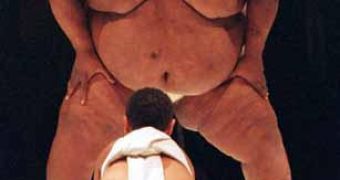Does being a model type mean you are a better athlete? Looking at the rugby players you could not say that. Scientists too have reached the same conclusion.
In a first study of this type, Thomas Nesser, assistant professor of physical education at Indiana State University has discovered that the link between muscle strength in the core of an athlete's body and their real strength and power in sports performance was moderate to poor (and thus inconsistent).
"The results are not showing that greater core strength is going to help you -- across the board -- with your sport. Only certain areas of the core showed a correlation with specific performance-based activities, and even then, the correlation was slight," said Nesser.
One example is the connection between trunk flexion (abdominal strength) and sprinting.
"Those athletes who had stronger trunk flexion did better on the sprint performance, but having that increased abdominal strength only accounted for 24 % of their better performance. This is a very small percentage. In addition, a relationship between sprint performance and back extension was not even identified." said Nesser.
This is the first research ever tackling core strength linked to performance in sports.
"There is a preponderance of information being generated right now about how to strengthen the core, with new equipment and videos being released at a dizzying pace, but the evidence that all this core strength will help you in your sport performance is not there. There is a lot of theory out there, and some good ideas that make sense, but we're trying to put the hard data to the hype." said Nesser.
Nesser checked 29 members of the NCAA Division I Indiana State football team, testing each athlete's core strength and in three strength variables and four performance variables.
Core tests assessed how long the athlete could hold each of four positions: back extension, trunk flexion, and left and right bridge. The measured strength variables were bench press, squat and power clean; and the performance variables were vertical jump, 20- and 40-yard sprints, and a 10-yard shuttle run. Torso stability was just slightly connected to overall power and performance.
"We were surprised that core strength is only moderately responsible or related to an athlete's overall strength and power performance, based on the variables we tested, so we are continuing our research in this area and endeavoring to discover if core-specific training is really necessary, and if athletes with superior core strength are capable of doing greater things." said Nesser.
Core stability can be important for injury prevention, but the new research points out that core strength exercises are not worthy of an athlete's time and energy while intending to increase their performances. But for non-performance average person, the story seems different: core strength is more important for the overall fitness.
"Having a strong core can help everybody in their daily activities, whether that's lifting and holding a child, or carrying an unbalanced load of groceries. We know that core muscle strength helps with balance and stability, but what we don't know yet is if an increase in core strength plays a significant role with respect to sports." explained Nesser.

 14 DAY TRIAL //
14 DAY TRIAL //